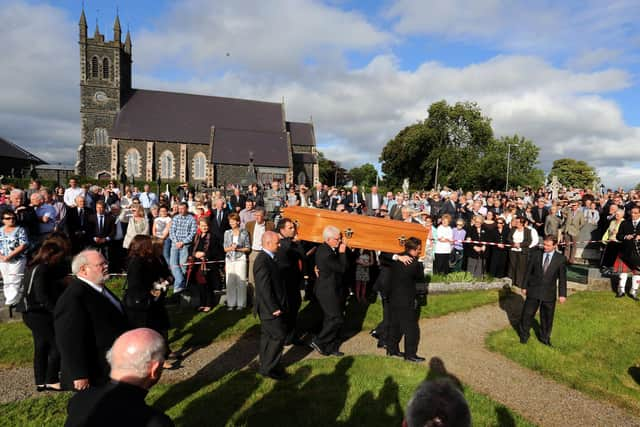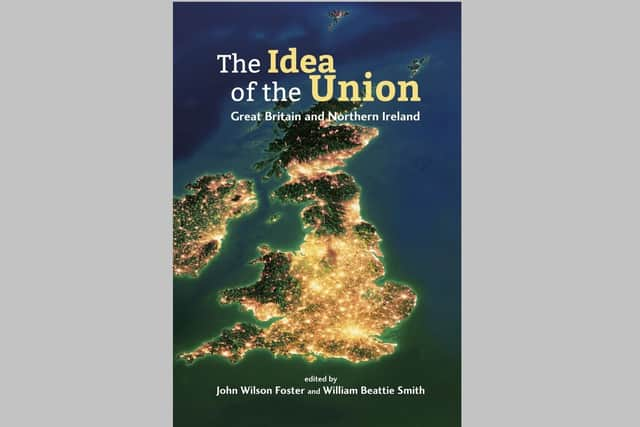Book extract: It is time for moderate civic unionism, for too long muted, to speak up or lose the Union


I have lived outside Northern Ireland for half my working life in university environments and policy advisory roles in the United States, England and Scotland.
Having now returned home to retire, sentiment and affection for the Union prompt me to write.
Advertisement
Hide AdAdvertisement
Hide AdTo me, Northern Ireland represents the corner of the Union which is both Irish and British.


My cultural identity is bound to a feeling for the place and its symbolically endowed landscape which incorporates both these dimensions alongside, in particular, a strong Scottish link.
To distil the essence of unionism in dry constitutional-legal relationships, obligations and rights or even economic interest, important as these may be, does not get to the more visceral cultural factors generating broad group identity.
Like John Wilson Foster “I am a unionist because unionism is my culture”, a constituent part of a broader British culture which I unapologetically embrace.
Advertisement
Hide AdAdvertisement
Hide AdThat unionist culture is shallow, based on economic supremacy, is still a view with currency. It met with short shrift from the respected political scientist John Whyte whom I had the good fortune to be lectured by as an economics and politics undergraduate at Queen’s University Belfast. In his influential book Interpreting Northern Ireland (1990) he warned not “to place too little weight on cultural factors”.
He pointed out that “if economics outweighed culture, one might have expected the Protestant farmers west of the Bann, whose material interests were much closer to those of their Catholic neighbours than they were to the workers and industrialists of the Belfast area, to have been drawn to nationalist Ireland, but in fact they were quite as staunch unionists as any other Protestants in Ulster” .
The Good Friday/Belfast Agreement (GFA) of 1998, of course, acknowledges the centrality of culture with the institutionalised recognition of differences between the two major cultural traditions in Northern Ireland. However, the hoped-for civic culture bridging the ethnic divide has failed to come forth.
Brexit may have deepened the ethnic divide but it is not the source.
Advertisement
Hide AdAdvertisement
Hide AdWhile unionism on the whole pragmatically saw the GFA as the best available, republicanism saw the agreement as a transitional step towards full Irish political unification.
The result has been a war of attrition. What is needed is a notion of cultural identities embedded in a civic culture of openness, dialogue and honest communication which is not closed to the potentially novel and perhaps unexpected.
Symbolic handshakes between former Sinn Féin Deputy First Minister, Martin McGuiness, and Queen Elizabeth in June 2012, and between Sinn Féin leader Gerry Adams and the heir to the British throne three years later, went some way towards normalising relations between the British state and Irish republicanism.
But they cannot elide what is perceived by unionists as intolerance of British-Irishness on the island of Ireland.
Advertisement
Hide AdAdvertisement
Hide AdThe call by Sinn Féin for unionists to join in building a ‘new Ireland’ (as opposed to the harsher ‘united Ireland’) consisting of a rainbow of identities, is a velvet touch in relation to which unionism has cause to be sceptical.
That political republicanism cannot acknowledge ‘Northern Ireland’ as the name of the British jurisdiction which the ‘new Ireland’ seeks to subsume is to unionism a longstanding cause of irritation.
As the IRA realised that they had to abandon their failed military strategy, they set about undermining unionist culture and refashioning history. As Connal Parr expresses it in Inventing the Myth: Political Passions and the Ulster Protestant Imagination (2017): “culture functioned as an integral path for Irish Republicans to move away from physical force methods with culture not decommissioned by republicans but rather ‘militarised’”.
To engage this cultural politics unionism needs to have a strategy.
Advertisement
Hide AdAdvertisement
Hide AdIn his ‘Ulster at the Crossroads’ television address almost 50 years ago, Terence O’Neill pointed out that the only future for unionism was to be inclusive.
Staunch unionist adherence to a past identity has outlived its sell-by date. A narrow-minded, socially conservative image, so often projected by political unionism in uncompromising rhetoric, has no future.
The prominent cultural geographer Estyn Evans observed over 30 years ago that unionists “still obstinately refuse to call themselves Irish”.
The romantic business of Irish nation-building left little room for those of ‘planter stock’ especially when that romanticism was used as a republican badge of identity. With romantic mists now clearing, the way is open for unionists to assert their own brand of Irishness which is shot through with Britishness as well.
Advertisement
Hide AdAdvertisement
Hide AdNothing brought this failure to claim common roots in Irish soil home to me more than the absence of any representative of political unionism at the funeral of the poet Seamus Heaney. However, such rootedness does not preclude the resting of primal desires of the heart within the wider context of the United Kingdom.
The mirror of cultural recognition casts back images of other bonds forged through shared experiences which stir the blood.
Titanic is a reminder of Irish-British industrial culture, the Somme of blood spilt in common. The praise of Winston Churchill for Northern Ireland’s World War Two efforts in armaments output and protection of the Northern convoys, would be another dramatic case in point. The reading of the list of the fallen pupils from my old school, Methodist College Belfast at the yearly remembrance service leaves a deep mark.
While shared memory is important in group identity, it risks being static if it’s not open to new challenges on the historical stage.
Advertisement
Hide AdAdvertisement
Hide AdUnionism must engage in present debates over the character of Britishness as it is reworked to meet an increasingly diverse society. With the possible secession of Scotland, the Union is in jeopardy.
Unionism cannot be a neutral observer from the crow’s nest of the Titanic.
The reality that the United Kingdom can be a cold house for Ulster unionism does not excuse the failure to make a positive case for the Union.
Moreover, that British and Irish are not mutually exclusive categories needs arguing. In particular, political unionism must make a case to the middle ground of Northern Catholic opinion, a ground which carelessness and lack of vision have let almost slip away.
Advertisement
Hide AdAdvertisement
Hide AdWhen Home Editor of The Times, Michael Gove authored a report in which he saw the hollowing out of Northern Ireland’s Britishness as a progressive process whereby the British state divests itself of responsibilities and strips the Province of evidence of its British character.
He saw a cultural war in which Britain is at best neutral and more often an objective ally of republicanism.
It is a bitter irony that Gove the politician overcame his own analysis and voted recently to make Ulster expendable to the Union.
However, the greater guilt lies with unionism for failing over the years to tackle the image of ‘a place apart’.
Advertisement
Hide AdAdvertisement
Hide AdThe lack of spade work over many years to align with UK mainstream concerns and conversation in the broader ‘family of nations’ has come home to haunt.
Whether attempts to make up ground belatedly and slowly will be enough remains to be seen.
Arlene Foster’s attendance at a GAA final was symbolic and welcome. Her address in May 2018 to a symposium on reimagining the wider UK Union post-Brexit was a small sign of intellectual engagement with a wider family of nations debate.
While Sinn Féin and others scramble for unionist participation in ‘conversations’ on a new Ireland, unionism is best served by reaching for a conversation with the rest of the UK on reinvigorating the plural Union we already share.
Advertisement
Hide AdAdvertisement
Hide AdIt is time for moderate civic unionism, for too long muted, to speak up or lose the Union.
Civic nationalism is active
on the constitutional chess-board. An equivalent response from unionism is long overdue. It is time to stop being embarrassed to be a unionist, not least, it must be said, among the ranks of academia.
• William J.V. Neill is Emeritus Professor of Spatial Planning at the University of Aberdeen and author of Urban Planning and Cultural Identity (2004)
• Taken from ‘The Idea of the Union: Great Britain and Northern Ireland’ edited by JW Foster & WB Smith. Contributors include David & Daphne Trimble, Owen Polley, Baroness Hoey, Ben Lowry. Blackstaff Press, £12.99 Click here for information on how to order a copy
Advertisement
Hide AdAdvertisement
Hide Adhttps://blackstaffpress.com/the-idea-of-the-union-9780993560729
• More on ‘The Idea of the Union’ below:
• Extract Dec 18: Claims of past bias against Catholics are greatly exaggerated
• Extract Dec 11: Lawfare against the UK state by nationalists cannot lose
• Extract from ‘The Idea of the Union’ Dec 8: There is silence among the Irish about their relocation to Britain
Advertisement
Hide AdAdvertisement
Hide Ad• Extract from ‘The Idea of the Union’ Dec 4: London is a cultural capital for the Irish
• Extract from David Trimble, Nov 27: I feel betrayed by the Northern Ireland Protocol, which rips out the heart of the 1998 Belfast Agreement
• Book Review of ‘The Idea of the Union’ Nov 20: Unionist leaders should read this vital defence of NI’s place in UK
• Authors of ‘The Idea of the Union’ Oct 30: We probe Irish nationalist myths in our new book which defends the Union
Advertisement
Hide AdAdvertisement
Hide Ad• Letter from Joe Lynam Dec 14: Book author is out of date about Irish voices in Britain, because we laud our contented lives in UK
——— ———
A message from the Editor:
Advertisement
Hide AdAdvertisement
Hide AdThank you for reading this story on our website. While I have your attention, I also have an important request to make of you.
With the coronavirus lockdowns having had a major impact on many of our advertisers — and consequently the revenue we receive — we are more reliant than ever on you taking out a digital subscription.
Subscribe to newsletter.co.uk and enjoy unlimited access to the best Northern Ireland and UK news and information online and on our app. With a digital subscription, you can read more than 5 articles, see fewer ads, enjoy faster load times, and get access to exclusive newsletters and content.
Visit
now to sign up.
Our journalism costs money and we rely on advertising, print and digital revenues to help to support them. By supporting us, we are able to support you in providing trusted, fact-checked content for this website.
Ben Lowry, Editor